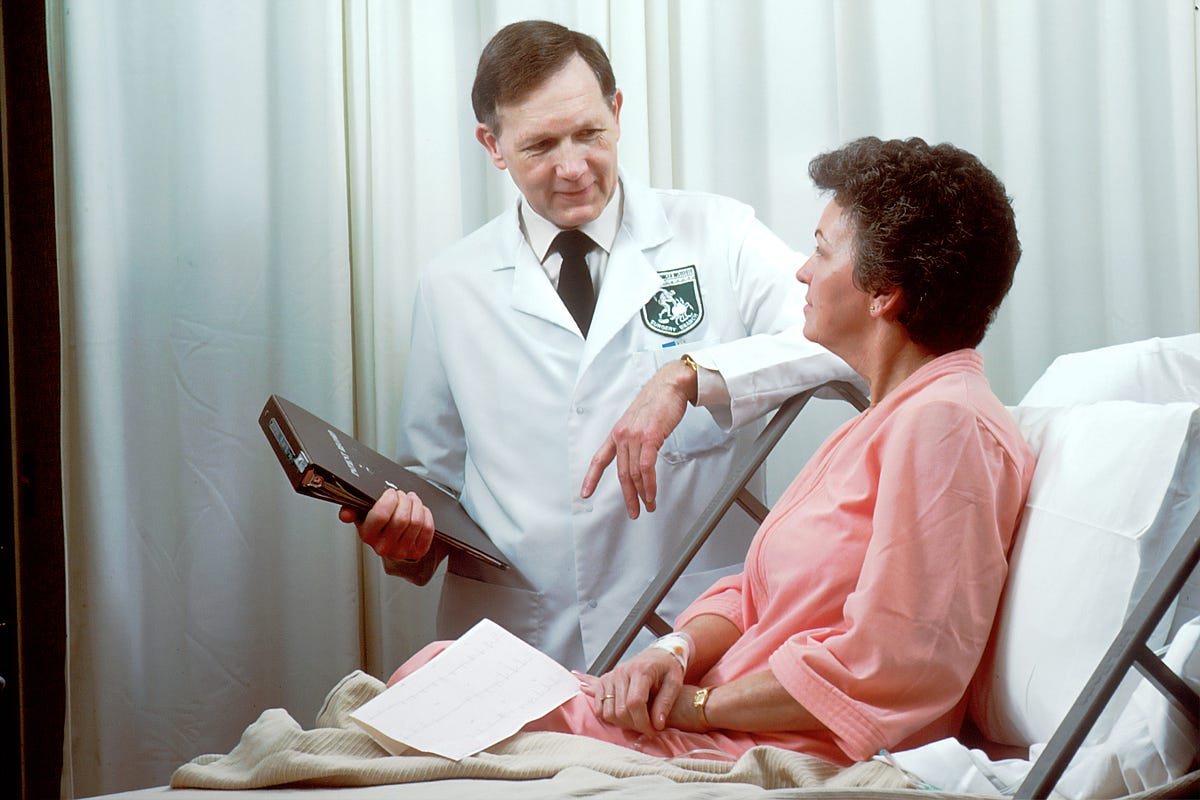
Let's stop killing ourselves this year. Can we talk?
First and foremost, I am neither a scientist nor a nutritionist. I am not a doctor. I am not a nutritional researcher. I humbly respect those who are, and in that vein am happy to pass along informational articles and books by people a lot better than I am on the topic.
In the spirit of full disclosure, I have also changed my mind about keto. While I do not believe the diet is for most people (people do not stick with keto for it really is difficult to sustain long-term), there are indeed many elements to it which can and do work for many.
All that said, yesterday two of my most trusted writers on the subject of nutrition, one a nutritionist and one a fellow Medium writer, a PhD who does his research and presents his material from long personal experience, provided articles which really underscore the importance of diet in preventing some of the biggest killers on our planet. Those would be heart disease and cancer, both of which you and I can largely avoid if we would be more mindful of what we put into our gullets.
One more note: the backdrop to this was my recent purchase of Dr. Robert Lustig's new book Metabolical: The Lure and the Lies of Processed Food, Nutrition, and Modern Medicine. Lustig's work has been instrumental in my better understanding of the forces allied against our health, and what we can do about it. That was his third, and I include in this story a few quotes from his work to make my points as well as a few other resources for your review.
I will be weaving their points together to make the larger point: the better researchers are all in agreement. That's good news, but only if we are paying attention and take action.
To that then:
You don’t die of obesity; you die of the diseases that “travel” with it. It’s these metabolic decompensations that make obesity the scourge that it is. Diabetes, hypertension, heart disease, cancer, and dementia–the things that kill you under the concept of “metabolic syndrome." -Robert H. Lustig, MD, MSL Fat Chance: Beating the Odds Against Sugar, Processed Food, Obesity, and Disease
Now, to the writers.
First, Dr. Mehmet Yildiz has presented many, many carefully-researched articles on diet and nutrition. I respect the level of commitment he has to addressing physical ailments which had in the past nearly crippled him, and how he has utilized intermittent fasting and keto to heal his body.
Dr. Yildiz has earned my trust and that of his readers with his consistently well-researched, thoroughly-documented personal stories about his health challenges and the results he's gotten from utilizing these scientifically-validated approaches.
To that:

From the article:
As mentioned in this NIH paper, “obesity is second only to tobacco as a preventable cause of cancer in the US. By multifactorial and often additive mechanisms, obesity leads to the development and promotion of 40% of the cancers diagnosed in this country, including post-menopausal breast, endometrial, colorectal, kidney, liver, and pancreatic cancers, among others.”
Dr. Yildiz is scientific in his approach and his writing style is almost professorial. He's detailed and thorough, and presents his findings in ways which allow the reader to understand both context and application. The best aspect of his writing, true to his researcher's nature, is that he provides plenty of links and references should the reader take issue.
This is in stark contrast to the pseudo-science and quasi-nutritional advice that we see everywhere offering quack cures based on nothing other than relieving us of our savings, and not saving our lives.
While some of the technical material in the article might be over your head, and it most certainly is over mine, the bottom line message from Dr. Yildiz' work is simple: The research shows that sugar (glucose) feeds cancers, sugar leads to all kinds of sicknesses and physical problems such as obesity, and obesity is a growing, massive problem, including leading to cancers. Obesity is the result of getting ill, which is the result of eating ultra-processed and sugar and chemical-laced foods.
To say nothing, of course, of how obesity as a co-morbidity makes Covid-19 a far more effective killer.
This is precisely in line with what Dr. Lustig writes. Obesity in and of itself doesn't make us sick. What we eat makes us sick and THEN we get obese, and from obesity we get a cascade of other illnesses, including cancer.
It’s not just about obesity, it never was.
The key to the kingdom is that it is not about obesity, it is about metabolic dysfunction and anyone can get it, and that’s what makes it a public health crisis, because obesity is a result of the problem, not the cause.
I never want to hear any of you talk about the obesity epidemic ever again, because that is the food industry’s mantra, that is what they use to obfuscate the truth, and you play right into it when you talk about it.
-Robert Lustig, MD, MSL
Medium and other online forums are full of fatphobia and body hate. That is because Big Food has been very, very VERY good at convincing us that fat is a lifestyle choice, while lacing nearly every damned thing we eat with sugar. Their tactics are the Tobacco Industry's evil tactics, and we have lined up behind the blame game en mass without taking these evil operators to task.
The other writer is Maria Cross, a UK-based nutrition writer who focuses on diet, gut and mental health. I particularly enjoy her articles about the microbiome. This is her recent piece:

From her article:
Aerobic glycolysis is a method that cancer cells appear to favour: they just love sugar. Warburg demonstrated how glucose uptake in tumour cells is 47%-70% compared to 2%-18% in normal cells.
“Due to the Warburg effect, glucose in dietary carbohydrates acts as a primary metabolic fuel for many tumors.”
This consumption of large quantities of glucose allows cancer cells to grow and divide in an uncontrolled manner.
In a 1966 lecture to the meeting of Nobel Laureates at Lindau, Bavaria, Otto Warburg commented:
“Cancer, above all other diseases, has countless secondary causes. But, even for cancer, there is only one prime cause. Summarized in a few words, the prime cause of cancer is the replacement of the respiration of oxygen in normal body cells by a fermentation of sugar.”
Both Dr. Yildiz and Cross quote Warburg, whose research was and continues to be deeply counter to the profit motives of Big Food.
You and I are living lab rats. Like it or not the world is full of people who are being fed poisonous toxins packaged as fun foods for the kids and adults alike. Every single one of us, when we choose chips over apples, sweetened cereals over plain oatmeal, Coca Cola over plain water is choosing death over life. We are poisoning our cells day by day, ingesting disease-inducing substances put into seductive packaging.
If you thought the Tuskegee Syphilis study was unethical, how is it that we tolerate such treatment of billions of people right now, right here, today, for profit at the expense of the world's health, its environment and all the animals with whom we share this little bubble?
And all the while, we blame fat people for getting fat because they are lazy, not because specialized food scientists are paid massive sums to get us addicted, keep us addicted and utterly unable to say no to their products. We are being manipulated by Big Food to hate people for getting sick as a result of eating foods that ads convince us are harmless, even as we do terrible harm to ourselves by eating them.
That makes us a world of lab rats.
We're even doing this to our pets. Cancer has become the number one killer of our dogs and cats. Our pets are obese, we feed them ice cream and treats to get likes on TikTok and YouTube, animal rescuers use toxic food to capture those sweet creatures and their new owners aren't much wiser.
What we think are treats for our Boo Bears is giving them tumors and bankrupting us in the same way that our sugar addictions are killing us off. To that:
In other words we aren't just killing ourselves. We're killing the very animals we say we love.
Would we blame our pets for being fat? Nope. We're doing it to them. You wanna blame someone, blame the owners. So you will forgive my asking why we blame people for getting fat, when fully 80% of what they buy in grocery stories is laced with fatty liver disease-causing sugars?
Don't believe me. Believe this:
“Barry Popkin of the University of North Carolina states that of the six hundred thousand food items for sale in the United States, 80 percent are laced with added sugar. Ninety percent of the food produced in the United States is sold to you by a total of ten conglomerates—Coca-Cola, ConAgra, Dole, General Mills, Hormel, Kraft, Nestle, Pepsico, Procter and Gamble, and Unilever.”
― Robert H. Lustig, Fat Chance: Beating the Odds Against Sugar, Processed Food, Obesity, and Disease
As Lustig points out, the food industry has utilized the same tobacco war techniques that were so very effective before the ads got banned: blame the individual, call him lazy, slothful and irresponsible as well as morally corrupt. That has caught on like wildfire. Even the questionable so-called "body positive" movement is as laced with fat-hate as our foods are laced with cancer-causing sugar and chemicals.
I like this article by a cardiovascular disease researcher which gets to the heart (pun intended) of the body positive movement:
We miss the point entirely when we focus exclusively on how we look vs what we put into our bodies. That totally sidesteps the damage we're doing to ourselves every day we can't give up toxic food, also known as ultra-processed food, which is chock-full of added sugars.
Cross writes:
The Diet Connection
Glucose is a sugar that comes from carbohydrate in the diet.
If carbohydrates — sugars — provide the fuel that tumours need to grow, does that mean that carbohydrates cause cancer? Not necessarily, though clearly there is a strong case, and surely plenty of motivation, for more in-depth research.
Or so you’d expect: astonishingly, there isn’t a great deal. Having said that, there are two dietary strategies that have been subjected to some scrutiny, and that are loaded with potential. These are calorie restriction and/or fasting, and ketogenic diets.
Money for big studies which absolutely, without a doubt prove that sugars grow cancers (which we do already know) is harder to get than paying off a university or a doctor to conduct highly-selective and very favorable research for your pure sugar breakfast "serial" (as in serial killer, pun intended).
Dr. Yildiz healed a number of physical ailments with these strategies,and he writes about them regularly. Maria Cross validates it and Lustig trumpets those truths in his best-selling books.
We aren't listening, either. Some of us are. Those who are listening are also taking their lives in hand. Making different choices, buying at the farmer's markets, and questioning claims of "organic" which is a very shady area because of the grotesque profit margins. You and I are likely far better off buying seasonal goods and honey from our neighbors wherever we can.
You and I are faced every single day with the same kinds of choices, depending in part on where we live. I love sweet food; I cannot have it in the house.
So I just don't buy it in the first place. Because the addictive characteristics of such food really is just that strong, as Lustig writes.
To that I will leave you with this:
What’s the difference between marketing and propaganda?
The truth.
The food industry has propagandized the last 40 years of nutritional information.
They got rich, and we got sick.
Time to embrace the real science of real food.
Robert Lustig, MD, MSL
Real food fills us up, supports our bodies, leaves us sated and happy. The journey to discover which foods work best for you is yours and yours alone. Our physicians, with barely twenty hours of nutritional training, are useless. The major corporations, with plenty of nutritional and chemical knowledge that they are using to addict us to killer foods with killer tastes, are just plain evil.
In this case, as with all things physical, we are our own best physicians. That begins with better information, better choices, and better care. I hope this article helps you along that lifelong journey.



Comments powered by Talkyard.